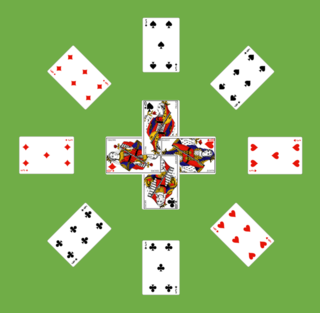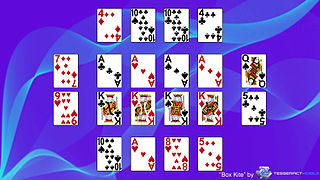Related Research Articles

Klondike, also known as Canfield, is a card game for one player and the best known and most popular version of the patience or solitaire family, as well as one of the most challenging in widespread play. It has spawned numerous variants including Batsford, Easthaven, King Albert, Thumb and Pouch, Somerset or Usk and Whitehead, as well as the American variants of the games, Agnes and Westcliff. The distinguishing feature of all variants is a triangular layout of the tableau, building in ascending sequence and packing in descending order.

Calculation is a solitaire card game played with a standard pack of 52 cards. It is part of the Sir Tommy family of patience games. It has its origin in France, where it is known as La Plus Belle.

Quadrille is the name of two loosely related card games of the Patience or solitaire type which are often confused. Both use a pack of 52 playing cards. The earlier one was also known as La Française or Royal Quadrille, the slightly later one as Captive Queens. The name is derived from the desired outcome of the earlier game in which the four Kings and Queens are arranged in a square formation as in the European dance of quadrille that was fashionable in the 18th and 19th centuries.
Salic Law is a solitaire card game using two decks of 52 playing cards each. It is named after the Salic Law which prohibits women from ascending to the throne or obtaining inheritance.
Royal Cotillion is a solitaire card game which uses two decks of 52 playing cards each. The name probably derives from the fact that since the two kings and two queens of the same suit, the king and queen of each suit dance the cotillion. It has been given the alternate name of Lords and Ladies because if the game is won, the final layout will show the king and queen of each suit together.
Bisley is a patience or card solitaire which uses a deck of 52 playing cards, and while difficult, it often can be completed successfully. It is closely related to Baker's Dozen, but the foundations are built upwards from Ace and downwards from King simultaneously. It is one of the few one-deck games in which the player has options on which foundation a card can be placed.
British Square is a patience or solitaire card game which uses two decks of 52 playing cards each. It is a fan-type game in the style of La Belle Lucie. It has an unusual feature of switchback building whereby each foundation is first built up and then built down.
Crescent is a solitaire card game played with two decks of playing cards mixed together. The game is so called because when the cards are dealt properly, the resulting piles should form a large arc or a crescent. An alternative and less common name for the game is La Demi-Lune.
Perseverance is a solitaire card game played with a deck of 52 playing cards. The reason for the name is not known, but likely originates in the fact that perseverance is necessary to succeed.
Big Ben is a patience or card solitaire which uses two decks of playing cards mixed together. It is named after Big Ben, the nickname of the clock tower of the Palace of Westminster in London.
Westcliff is the name of two closely related patience or card solitaire games of the simple packer type, both of which are played using a deck of 52 playing cards. One version is particularly easy to win, with odds of 9 in 10; the other is harder with odds closer to 1 in 4. The game has a variant, Easthaven.
Napoleon's Square is a patience or solitaire card game which uses two decks of playing cards. First described in a revised edition of Lady Cadogan's Illustrated Games of Patience or Solitaire in the early 1900s, it is an easy variation of Napoleon at St Helena. It is not determined if Napoleon actually played this game, or any solitaire game named after him.
Deuces or Twos is a patience or card solitaire game of English origin which is played with two packs of playing cards. It is so called because each foundation starts with a Deuce, or Two. It belongs to a family of card games that includes Busy Aces, which is derived in turn from Napoleon at St Helena.
Fortress is a patience or solitaire card game which is played with a deck of playing cards, in which the entire deck is laid out. It is a member of the Castle family of solitaire games, but has two more tableau piles than Beleaguered Castle and the piles are shorter.
Imaginary Thirteen is a solitaire card game which is played with two decks of playing cards. Its gameplay makes it a two-deck version of Calculation and its name is taken from the fact that when a sum is over thirteen, thirteen is subtracted to get the value of the next card, with spot cards worth their face value, jacks eleven, queens twelve, and kings thirteen.
Jubilee is the name given to two solitaire card games, both played with two decks of playing cards. Both games are so-called because they were created during the time of the Golden Jubilee of Queen Victoria in 1887. One of the games has an ornate layout, while the other is simpler and it belongs to the family of games which include Sir Tommy, Strategy, and Calculation.
Archway is a patience or solitaire card game of the open builder type that uses two packs of 52 playing cards. Its goal is to bring all 104 cards into the foundation. It was invented by David Parlett, and is based on an old French solitaire game called La Chatelaine.
Algerian or Algerian Patience is a unique and difficult patience or card solitaire using two decks of playing cards. The object of the game is to build 8 foundations down from King to Ace or up from Ace to King in suit.
Aces and Kings is a challenging and original solitaire game using two decks of playing cards, and was created by Thomas Warfield. The object of the game is to build 8 foundations down from King to Ace or up from Ace to King without regard to suit.

Box Kite is a moderately difficult patience or card solitaire using two packs. The object of the game is to move all of the cards to the foundations. It is a variant of the old game of St. Helena.
References
- ↑ Parodi, Francesca (28 March 2004). Big Book of Solitaire . Sterling. p. 115. ISBN 9781402709449.
- ↑ Michael Keller, "Mount Olympus - a detective story of sorts", Solitaire Laboratory, 2015.
